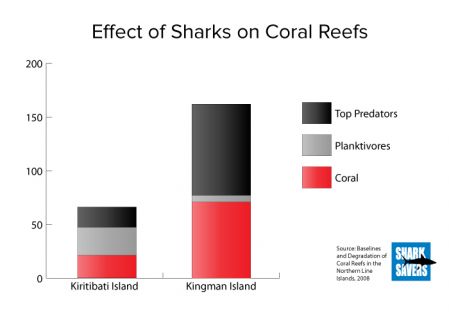Sharks have evolved in a tight inter-dependency with their ecosystem. Sharks keep prey popluations healthier by going after the old, sick and very young, influence the behaviour and distribution of other species and keep the population numbers of other species in proper balance by consuming them as prey. When the top predator is removed, second tier and faster reproducing predators can grow in abundance, causing further disruption and loss1.
In one scientific study of the mid-Atlantic part of the United States, 11 species of sharks were virtually eliminated. Of the 14 species of marine life that those sharks used to eat, 12 became more plentiful and caused great damage to the ecosystem. The cownose ray populations, for example, grew out of control and destroyed the population of bay scallops, their favorite food. The scallop fishery, which had been thriving for over 100 years, was virtually gone, with scallop catch dropping to only 13% of its high point2.
The significant decline of shark populations in parts of the ocean has resulted in dangerous and unpredictable shifts in the ecosystem. In a study of coral reef degredation, scientists found that a greater number of apex predators like sharks was associated with high cover of reef-building corals and algae and low levels of coral disease. Where the ecosystem was left intact, like at the wildlife refuge of Kingman island, the reefs were also better able to recover from disease and warm episodes that result from global warming.3

Less sharks does not mean more fish for fishermen to eat and sell. Some studies show that healthy shark populations actually support healthier and more abundant commercially important fish species, like tuna.4 More sharks and healthy, abundant ecosystems tend to go together.
Studies from many locations in the world have shown that living sharks are much more valuable than dead ones.5
Divers and tourists spend a lot of money to travel to dive sites that are teeming with fish of different species and vibrant habitats, listing sharks as the number one animal they want to see on a dive.6 In areas where sharks have been overfished, the sustainable income from ecotourism is lost.
The economic value of sharks to local communities gained via ecotourism far outweighs the relatively modest and very short-lived economic gain of killing sharks.
Pristine locations that have retained healthy shark populations support higher levels of biomass of other marine organisms and healthier reefs than those habitats that have a history of intense shark fishing.3 This is the condition that supports both lucrative ecotourism and sustainable fishing.
1 - Estes, J.A., Terborgh, J., Brashares, J.S., Power, M.E., Berger, J., Bond, W. J., Carpenter, S.R., Essington, T.E., Holt, R.D., Jackson, J.B.C., Marquis, R.J., Oksanen, L., Oksanen, T., Pain, R.T., Pikitch, E.K., Ripple, W.J., Sandin, S.A., Scheffer, M., Schoener, T.W., Shurin, J.B., Sinclair, A.R.E., Soule, M.E., Virtanen, R., and Wardle, D.A. 2011. Trophic downgrading of planet Earth. Science, 333(6040): 301-306.
2 - Myers, R.A., Baum, J.K., Shepherd, T. D., Powers, S.P., and Peterson, C.H. 2007 Cascading Effects of the Loss of Apex Predatory Sharks from a Coastal Ocean. Science, 315: 1846-1850
3- Sandin, S. A., J. E. Smith, E. E. DeMartinin, E. A. Dinsdale and S. D. D. et al. 2008. Baselines and Degradation of Coral Reefs in the Northern Line Islands. PLoS ONE 3: 1-11 ; Stevenson, C., Katz, L.S., Micheli, F., Block, B., Heiman, K.W., Perle, C., Weng, K., Dunbar, R., and Witting, J. 2007. High apex predator biomass on remote Pacific islands. Coral Reefs 26: 47-51.
4 - Ferretti, F., Worm, B., Britten, G.L., Heithaus, M.R., and Lotze, H.K. 2010. Pattern and ecosystem consequences of shark declines in the ocean. Ecology Letters, 13: 1055-1071.
5 - Vianna G,M,S., Meekan, M.G., Pannell, D., Marsh, S., Meeuwig, J. 2012. Socio-economic value and community benefits from shark-diving tourism in Palau: A sustainable use of reef shark populations. Biological Conservation, 145: 267-277; Vianna G.M.S., Meeuwig, J.J., Pannell, D., Sykes, H., and Meekan, M.G. 2011. The socio-economic value of the shark-diving industry in Fiji. Austalian Institute of Marine Science. University of Western Australia. Perth (26pp).
6 - White, L. 2008. Sea the value: quantifying the value of marine life to divers. Msc thesis, Nicholas School of the Environment and Earth Sciences of Duke University, Durham, North Carolina.